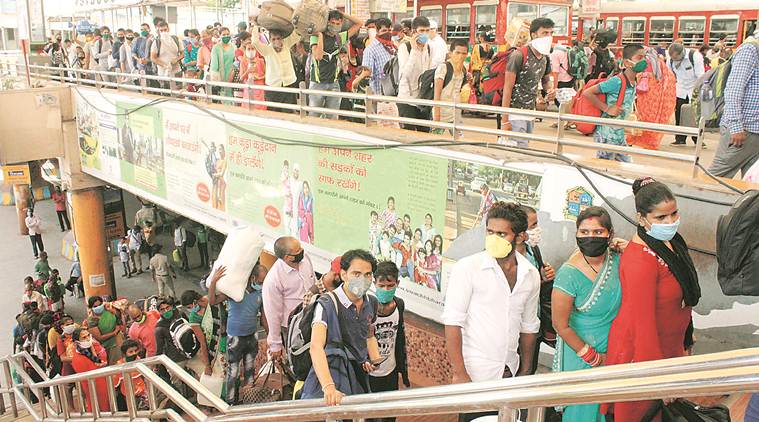
The Indian Express
As Shramik Special trains ‘stray’, Railways notifies ‘route rationalisation’ to explain diversions
The diversions have been done so that trains are not held up at one place for hours without water and food, a senior Railways official told The Indian Express.
by Avishek G DastidarWith diversion of Shramik Special trains to navigate network congestion blowing up into a controversy, even as delayed running of these trains and shortage of food and water on board continue to plague the Railways, the national transporter has officially notified the alternative or diverted paths and called it route “rationalisation”.
The diversions have been done so that trains are not held up at one place for hours without water and food, a senior Railways official told The Indian Express.
A train, this officer emphasised to reject the criticism, “never gets lost”.
According to Railways officials, there are multiple ways for a train to reach a destination from a “source” – or originating – station, and a “rationalised route” is one that may not be the usual route during normal times. But since the new route is notified, and is scheduled within the system, it cannot be technically called a diversion, an official explained.
Officials said this helps better planning of meals and watering of trains en route, and also cuts down the element of surprise for railway divisions on the way.
Shramik Special trains bound for Bihar and further on were earlier delayed by an average 24 hours, which officials said have come down to under five hours in the last couple of days. “No diversions now. All trains originating during the last three days are running on their pre-scheduled rationalised routes,” a ministry spokesperson said.
Officials said Manikpur Junction of North Central Railway, which normally falls on route of most of these trains from western India to destinations in Uttar Pradesh and Bihar, was a major source of congestion until a couple of days ago, as trains from Central Railway and Western Railway converged there. While normally it took a rain around 90 minutes or so to cross this section, trains were taking up to four hours or so to do so due to congestion. But the “rationalised route plan” has assigned other routes through Northern Railway, West-Central Railway and North Western Railway to decongest Manikpur, and other such crossings, and given destination stations a breather, they maintained.
Given capacity constraints, some railway zones have decreased and even stopped loading of goods trains to make way for Shramik Specials.
Officials said while busy sections such as Allahabad that see off around 300 trains one way every day in normal times are handling fewer – around 250 – Shramik Specials per day, these trains are not running as per a set timetable. Field officials told The Indian Express that politicisation of the Shramik Specials have led to “indiscriminate” introduction of these trains without looking at network and handling capacity.
“At the source station, boarding is taking a long time after concluding all health protocol. So if a train misses its scheduled path set by us, it has to eat into or share another train’s path,” a senior official said. “Places like Gorakhpur, which do not have terminal capacity to receive so many trains in quick succession, takes time to release platforms. This results in piling up of trains.”
With availability of meals in diverted trains proving to be a major pain point, the Railways has amended its General Financial Rules to enable a divisional railway manager to spend up to Rs 1 lakh for each train to arrange for food, water, etc. Officials in IRCTC said the PSU has so far supplied at least 74 lakh meals on board the Shramik Specials, but delivering to the diverted, unscheduled trains has been a challenge.
To make up for this, divisional officers in places such as UP and Bihar, among others, have made use of the new financial powers to arrange for food at remote locations, as also to load precooked food on trains.
On Tuesday, Railways planned to run 315 Shramik Special trains, a majority of which were scheduled from Maharashtra. However, Railways Minister Piyush Goyal stated that only 27 could be run. He tweeted: “Eight five of 145 trains arranged from Maharashtra were supposed to run today. But since the state government could not arrange passengers, we could run only 27 by 6 PM…”
Until Monday, 3,274 Shramik Specials were run to transport more than 44 lakh passengers; over 1 crore water bottles and 74 lakh free meals were distributed, the Railways said in a statement.
Boarding protocol managed by “source” states has also emerged as problem, officials said. There have been multiple instances of states filling trains meant for one place with people bound for another, for which there may be a different Shramik Special on a different day. A few days ago, for instance, Varanasi received a Shramik Special with passengers bound for Bhagalpur. A separate train was arranged for them from Varanasi.
Another problem that has emerged is that of crew members’ — engine drivers, assistants, guards — demand to be given shorter runs so they can return home instead of staying at “running rooms” designated for them, as is the usual practice. Instead of longer runs, crews are thus being changed at short intervals, officials pointed out.